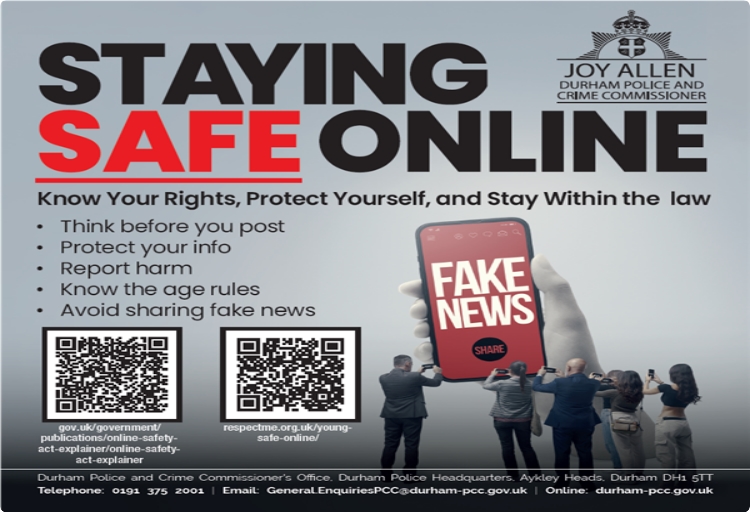
|
||
|
|
||
|
||
|
A message from the Durham Police and Crime Commissioner, Joy Allen: Staying Safe Online- Know Your Rights, Protect Yourself and Stay Within the Law |
||
|
As we are spending more of our time online, whether it is shopping, socialising or sharing opinions on social platforms like Facebook and X (formally Twitter). It is more important than ever to understand how to stay safe, protect your digital footprint and comply with the law. The Government’s new Online Safety Act has been designed to make the internet a safer place for everyone, especially children and vulnerable people. It places new legal duties on tech companies to ensure they remove harmful content and protect users. But online safety is not just the responsibility of big platforms, we all have a role to play and I hope this article helps you and your family and friends to stay safe online and on the right side of the law. So whether you are a parent, grandparent, a young person or an everyday social media user, here are some essential tips that will help keep yourself and others safe online: 1. Think Before You Post It is easy to write something in the heat of the moment, but online speech is not anonymous and can have real-world consequences. Under UK law, it is an offence to post anything threatening, harassing, or abusive online. You could face criminal charges for: Tip: If you would not say it to someone’s face in public, do not post it online. 2. Protect Your Personal Information Be cautious about sharing your full name, location, date of birth, and personal documents online. Criminals can use this information for identity theft or fraud. Tip: Use privacy settings to control who sees your content. Do not accept friend requests or messages from people you do not know. 3. Report Harmful Content If you come across abusive posts, fake accounts, or harmful misinformation, report it to the relevant social media platform immediately. Under the Online Safety Act, platforms are now legally obliged to act on reports of illegal or harmful content. Tip: If someone is in danger, contact the police directly. Screenshots can help as evidence. 4. Understand Age Restrictions Online platforms must now enforce age limits, especially for content involving gambling, pornography or extreme material. Parents should be aware of what their children are accessing and make use of parental controls. Tip: Talk to your children about what they do online and agree on ground rules for screen time and social media use. 5. Avoid Sharing Misleading or Harmful Information It is now an offence to deliberately spread harmful disinformation that causes panic or incites violence. This includes false health claims, hoaxes, and hate-driven conspiracy theories. Tip: Check the source before sharing news. If in doubt, don’t share. Finally The internet offers amazing opportunities, but it also comes with risks. That means knowing the law, looking out for one another, and reporting harm when we see it. As Police and Crime Commissioner, I’m committed to working with local schools, police, and partners to support education, enforcement, and the protection of vulnerable users online. Together, we can help ensure that our digital spaces are safe for everyone.
| ||
Reply to this message | ||
|
|





